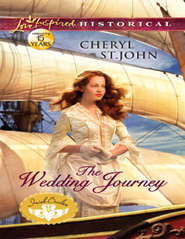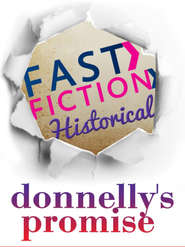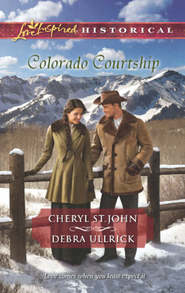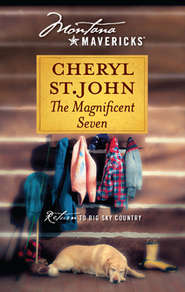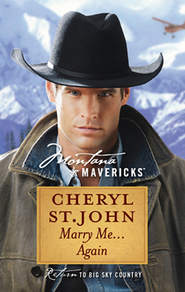По всем вопросам обращайтесь на: info@litportal.ru
(©) 2003-2024.
✖
Badlands Bride
Настройки чтения
Размер шрифта
Высота строк
Поля
A moment of silence followed Charles’s comment, wherein Hallie imagined them nodding piously at one another.
“Yes, when the men who sent for those gals set eyes on them,” Samuel agreed. “No. We don’t have anyone that far west.”
“Too bad,” Turner said.
“Too bad, indeed,” Charles said. “We could have had a real follow-up story there.”
“Let’s just hope the Journal doesn’t think of it.” Samuel added.
Heartbroken, Hallie gathered her skirts and trod stealthily back out the front door. She walked the brick street without direction. It never entered her mind to go home. Her mother would only tell her as she always did that her father and brothers did such things for her own good. Clarisse Wainwright had been born and bred to be a genteel wife and a mother to Samuel’s sons. The fact that Hallie had come along had been an inconvenience to all of them, or so Hallie saw it.
Hallie hadn’t been born the proper gender to take a prominent place at the newspaper, as much as she wished to, as much as she knew the same amount of ink flowed through her veins as her brothers’. They’d patted her on the head and sent her on her way since she’d been old enough to toddle after them.
The truth lay on her crushed heart like lead. They would never see her as good enough, as equal, as valuable or necessary. Even Clarisse had been necessary only to the point of bringing Charles and Turner into the world. Now her mother lived the life of a pampered society wife, spending her days with her gardening club, at the tearoom and playing the latest vogue card game, bridge.
Hallie would never accept an invalid life like that. Surely there was some way to prove herself to her father. If only he would give her a chance, he’d see she was as capable as Charles and Turner—and more so than Evan Hunter—because she’d been born to the life.
If only she’d been born a man.
Her mother had forced her into dresses and threatened her with Miss Abernathy’s if she didn’t take an interest in her hair and clothing. Hallie had conformed to their expectations—to the world’s expectations—and resigned herself to her unchangeable, unappreciated gender. But she could not accept the role they wanted her to play. Hallie wanted more.
Should she give up or go on printing the same outdated page of her life over and over? Neither of the choices appealed to her.
Finding herself across from the tearoom, Hallie stared dismally at the brownstone facade beside the hotel and recalled her interview with Tess Cordell. Charles had said the real story was where Tess was going. There must be some way Hallie could keep in touch with her. Perhaps, even though the mail took weeks, she could convince Tess to correspond with her for future articles. Maybe Tess would send information about the other young women, too. It wouldn’t be anywhere close to as in-depth reporting as she needed, but it was the only answer she had.
She set out for Miss Abernathy’s, realizing she’d answered her own question. She couldn’t give up. Not when the result meant settling for a superficial existence.
She found Tess Cordell hurriedly packing, arranging and rearranging, discarding items she couldn’t fit into the two small bags open on the bed. Hallie surveyed the disarray in the small room. “Whatever are you doing? Yesterday you were all packed except for your overnight valise.”
“I’ve changed plans, Miss Wainwright.” Cheeks flushed, her fair hair atumble, she tucked a cotton night rail into the battered valise and clasped her hands together. Her blue eyes sparkled with excitement. “I’m going to Philadelphia.”
“Philadelphia!” Disappointment sank in Hallie’s stomach. “What about the Dakotas?”
Tess managed to look a little sheepish. She busied herself stuffing items back into the trunk against the wall. “I was engaged until a few months ago. Eric—he’s my fiancé—well, his family put pressure on him to call the engagement off. He did, and I was devastated.”
The strength left Hallie’s legs and she wilted onto a wooden chair.
“Mr. DeWitt’s ad seemed the only thing for me to do at the time,” she explained. “But last night Eric came to see me. He’s taken a position in a Philadelphia law office, and he realized he couldn’t go without me. You know that expression ‘smart as a Philadelphia lawyer’? Well, that’s Eric. Rich, too. And he loves me. So you see there’s nothing else I could do but go with him.”
“But this DeWitt fellow...”
Tess reached toward the bureau and turned back, tossing two envelopes on the bed. “Eric gave me money to replace what I spent. Of course, it must be returned to Mr. DeWitt.... Will you be a dear and see to it for me?”
Hallie stared at the envelopes, her plans dashed.
Tess buckled two leather straps around the last case. “I’ve asked Miss Abernathy to store my trunk until Eric can send someone for it.” She tidied her hair and settled her bonnet on her head. “I hope I didn’t rum your story, Miss Wainwright, but this is the best opportunity I’m ever going to have. Please understand.”
In disbelief, Hallie watched her pick up her bags and hurry through the doorway. “Good luck,” she said to the empty room.
She sat in the silence, absorbing yet another wash of disillusionment. As far as she knew there were still three other women planning to leave on the stage the following day. Perhaps one of them would agree to help Hallie with her articles. None had been as young or as personable as Tess, but she would have to make do.
She moved from the chair to the rumpled bed and picked up the envelopes. One contained the letter she’d seen Tess with. Hallie unfolded it and read the scrawled handwriting.
Dear Miss Cordell,
My wife must be able to read and write. Enclosed is a cashier’s check to purchase whatever you will need. There are no women’s shops here. The Territory is far from the life you are used to, but the land is beautiful and you will have everything you need. I’ve never been married. I trapped for many winters and now operate a freight company and stage line. A justice will meet us at the Stone Creek Station next month.
Sincerely,
Cooper DeWitt
Hallie tucked the letter back into the envelope and picked up the other, pulling out a stage ticket and two hundred dollars. No wonder Tess had been impressed.
She fingered the ticket, took it out and turned it over a couple of times. The real story’s on the other end of that stage line.
With a little thrill of excitement, she realized what she was thinking. No. It was too dangerous! She slid the ticket back into the envelope. She would cash it in, buy a cashier’s check for the amount plus the cash and return it to DeWitt.
We could have had a real follow-up story there. The voices from the other side of her father’s door haunted her. Get Hallie off our backs...let’s hope the Journal doesn’t think of it... Turner’s condescending tone came to her. What are you pouting about now, Precious?
What if she did it? What if she used this ticket to get her to the Dakotas? She could interview the men who sent for wives. She could get the follow-up story on the other women—the real brides.
But what about this DeWitt person? He was expecting a wife. Hallie turned that question over a few times before a solution came to mind. She could simply explain the situation to him, give him his money back and call it square She could get her story, and he could send for another wife. He’d have to anyway, since Tess had backed out.
Enthusiastic now, she planned her departure. She couldn’t tell her family. They’d never allow it. Her mother would have a conniption fit. It would most likely take them a day to notice she was missing, and by then she’d be long gone. She’d write from the first station.
Satisfied with her plan, Hallie tucked the envelopes into her reticule and stood. She had packing to do if she was going to catch that stage tomorrow.
Cooper paced the dusty expanse of hard-packed earth surrounding the stage station and surveyed the broad horizon, temporarily forgetting its stark beauty. He saw only the barrenness of the land...the lack of people and buildings. He’d told her in the letter, but seeing was believing. And by now, wherever the coach was, she’d had time to see plenty.
Cooper frowned at the vista before him. The stage should have arrived sometime that morning. It was now early afternoon and there was still no sign of it. In his mind the delay signaled only one thing: trouble.
“Sky’s clear here,” Stuart Waring, another of the impatient grooms, said from behind him. “But that don’t mean they didn’t run into rain or mud.”
Cooper turned to the two farmers sitting on crates against the log wall. Stuart wore a faded shirt with a string tie cinched around his scrawny neck. His scarred boots had been polished and shined. The ever-present wind snatched at his hat, and he secured it quickly.
“Coulda had a horse go lame,” Vernon Forbes said. His jacket bore threadbare spots at the wrists and elbows, and he held a small, battered package. A gift for his bride? Cooper hadn’t thought of that.
Angus Hallstrom, the station operator who worked for Cooper, leaned against the doorframe and picked his teeth with a piece of straw. “Fact that the stage’s been robbed three times in as many months ain’t sittin’ well with me.”
Cooper had been thinking the same thing. He didn’t like the uncomfortable feeling that tiptoed up his spine and settled on his shoulders. Having money stolen or losing a month’s mail was one thing... harm coming to the woman he intended to marry was another.
George Gaston, the portly justice, sat in the only chair and sipped black coffee from a dented metal cup. Cooper observed the motley group of men and imagined what the city women would think of them.
A strange uncertainty rippled in his chest, and he glanced down at his clean buckskin pants and fringed shirt. What would Tess Cordell think of him?
Fifteen years ago, even ten years ago, content living, hunting and trapping with the Oglala, he’d never have imagined he would pair himself with a white woman. Time had changed that, as it had the existence of his people—rather, the people of his heart—and most of them were surviving on reservation land.
Buffalo no longer roamed the grasslands in great herds, like rippling black seas. The Oglala, Santee, Yankton and other Sioux had been forced to make treaties in order to receive food.






